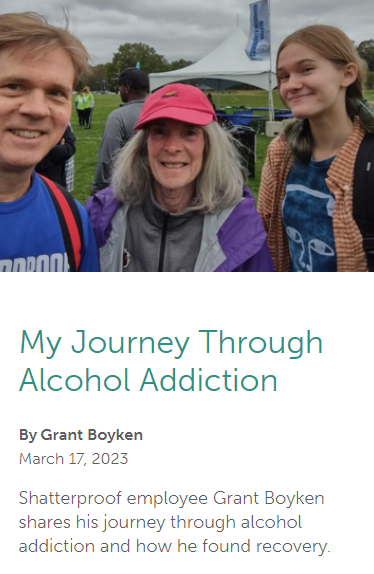April is Alcohol Awareness Month
NOTE: Sober Linings Playbook is a personal website. Any views or opinions expressed herein belong solely to the website owner and do not represent those of individuals or organizations the owner may be associated with in a professional or personal capacity, unless explicitly stated.
Every April the National Council for Alcoholism and Drug Dependence sponsors Alcohol Awareness Month to increase awareness of the nation’s number one substance use-related public health problem. According to the National Institutes for Health, more than 140,000 people in the U.S. die from alcohol-related causes annually, making alcohol the deadliest drug and the fourth-leading preventable cause of death in the U.S. As many recent studies have highlighted, even at moderate levels, alcohol has significant negative health consequences.
A recent story Oregon Public Broadcasting story dubs alcohol the “dirty little secret of the pandemic” and reminds readers to not lose sight of its dangers: Illicit drug use has – understandably – captured the most public attention and generated alarming headlines. Fentanyl can take people’s lives the first time they try it and is responsible for a rapidly increasing share of overdose deaths. But it’s a legal drug that arguably hurts - and kills - the most people. “Alcohol is the great dirty little secret of the pandemic,” said Dr. Robin Henderson, the chief executive for behavioral health for the Providence health system in Oregon. In 2021, alcohol was responsible for far more emergency department visits than any other substance nationally, according to the federal Substance Abuse and Mental Health Services Administration. (Oregon: Illegal substances are part of addiction problem in Oregon, but alcohol is biggest killer, Oregon Public Broadcasting - March 15, 2023)
I recently wrote a short piece about my own struggles with alcohol and my difficulties finding treatment. I thought I’d share that here. It was originally published on the Shatterproof Blog.
During my decades-long struggle with an alcohol use disorder, most of what I knew about getting help for addiction came from television shows and movies. As a result, I thought my only options were 12-step peer support meetings or a month-long stay in rehab. Unfortunately, I had trouble committing to peer support programs in the early days of my recovery journey. I had ruled out residential treatment as too disruptive to my work and family responsibilities. Not to mention the shame of having to explain a one-month absence to others.
When I was finally ready to ask for help, I turned to my doctor. He was compassionate and even willing to prescribe medications to help with dependence and cravings. But when I asked whether he or anyone in his practice could recommend a treatment program, he was at a loss. When I followed his suggestion to call my employer-sponsored health plan, the representative I spoke to recommended I find a treatment program on my own and ask the program to determine whether my health benefits covered their services.
Finding the Right Addiction Treatment Program
Fortunately, the first program I contacted after doing an online search was in my health plan’s network. The entire cost was covered. Even better, it happened to be an outpatient program. I hadn’t even known that was an option. I was able to go to work during the day and attend group and individual counseling sessions three nights per week.
As is common, I had some ups and downs after that first treatment experience, including a relapse that led to a resignation and a serious career setback. But it was a good program that helped plant the seeds of recovery and provided me with tools I use to this day. I would recommend it to others.
I felt lucky to have found that treatment program. But finding good treatment should not be a matter of luck. If my disease had been diabetes or cancer, my doctor would have known where to refer me and would not have left me on my own to search for care. If it was difficult for me to find addiction treatment, I can only imagine how much more difficult it must be for people with no health insurance and less experience navigating the healthcare system.
Discovering ATLAS
I first learned of Shatterproof’s Addiction Treatment Locator, Assessment, and Standards (ATLAS) platform when I heard the organization’s CEO and founder, Gary Mendell, speaking on a podcast. Because of my own experience, I immediately recognized the value of a free online treatment locator that can help guide users who, like me, know nothing about SUD treatment. ATLAS is what compelled me to become a volunteer Shatterproof ambassador and later, an employee who helped launch ATLAS in my home state of California.
ATLAS takes the guesswork out of searching for addiction treatment. This assessment tool helps shed light on the range of available treatment options. Robust filtering tools allow ATLAS users to choose treatment programs based on location, the type of insurance or other payments accepted, and the type and level of care provided. Importantly, ATLAS also displays information about the quality of care and the extent to which each treatment provider aligns with the Shatterproof National Principles of Care. Finally, ATLAS also allows users to review treatment providers and it displays those reviews to help others who are searching for treatment.
Like so many others who have struggled with substance use disorders, I have found helping others to be a crucial part of my recovery. Working with Shatterproof to ensure the growth and continued success of ATLAS is one of the ways I have found to give back.
___
That’s all for now. Until next month, stay tuned!



